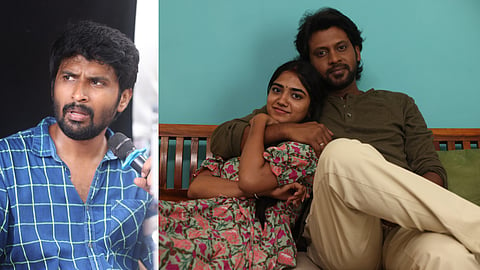

Beyond the fun, quirky story about the ‘struggles of a newly married couple’, Aan Paavam Pollathathu is also a film that is vocal about its commentary on, what the director claims to be, an oft-unspoken issue. “There are a lot of films that talk about the plight of women but I wanted to talk about what men go through,” says director Kalaiarasan Thangavel. Maybe, the reason the issue is under-discussed is because the mirror of this argument, the women’s issues, is overwhelming in number and more imminent in comparison? "Of course, we acknowledge that the cases where men suffer in marriages are low in comparison but this is a film where we shine light on a small albeit relevant issue that I think is worth discussing,” he says.
Even though the film is a light hearted commentary on the ‘suffering of men’, the director claims to have taken a balanced approach. “While the film begins by showing the husband suffering, we gradually learn that he is also at fault, he has a lot of backwards thoughts while his wife is extremely progressive.” He then asserts, “The issues shown here are not something I imagined or blew out of proportions. These are real and relevant issues. We referenced real cases while researching for the film, no one can deny these things. In the last three to four years, almost 40 percent of the alimony cases are fake.” The director then adds, “Aan Paavam Pollathathu is loosely based on a true story. We were careful not to generalise all women. This story is just about how some men are affected by toxic marriages.”
The trailer of Aan Paavam Pollathathu boldly declares that the film is dedicated to all ‘fake feminists’, an arguably incendiary phrase often used in heated social media arguments over gender equality. Kalaiarasan explains his understanding of the phrase by going to its roots. “Feminism fights against the injustice of denying an opportunity to women based on their gender. If whatever opportunity I get as a man is denied to a woman solely because of their gender, then fighting against it is the right thing to do. Similarly, something is wrong no matter who does it, a man or a woman. For example, drinking is injurious no matter who does it. I don’t think women’s empowerment is tied to drinking.” Kalaiarasan elaborates with another example. “If women’s voting right is denied based on gender then fighting for it is justified but I don’t know how that line of thought should be extended to drinking as well because alcohol affects the health of both the men and the women,” he says. Health issues, aside, there is the argument of freewill, and for that the director replies, “If a woman wants to drink of her own accord, for her own pleasure, then no one has the right to stop her but ‘I will drink because men drink too’ is a narrow demonstration of freedom and I don’t think that is right. There is a difference between doing something because you like it and doing something just to prove a point.”
Kalaiarasan cites celebrated Tamil poet kavikko Abdul Rahman’s verses as an inspiration for the film: ‘Koonda odachittu veliya varrathu thaan suthanthiram, koota odachittu varrathu illa’ (A bird’s freedom is about breaking out of the cage not breaking out of its own nest). The director humbly acknowledges that it is not his place to dictate rights and wrongs to the society. “I have no right to define what feminism is. And no one person has the right to say how anybody should live their lives and so it goes for me. My intention with this film is that it starts an open discussion regarding what is right and wrong,” concludes a confident Kalaiarsan.